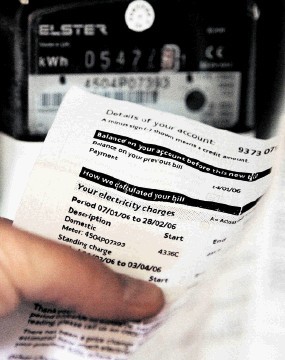
The introduction of an energy bill price cap should be brought forward before the start of the cold weather, ministers have been told.
Government opponents point out the current timetable for bringing in the measure by the end of the year was “half way through” the coming winter.
Labour is demanding the inclusion in legislation of a hard deadline for the cap to be in place, potentially the last weekend in October when the clocks go back.
Critics also argued the Government proposals did not go far enough in tackling “the broken energy market”.
Concerns were raised in the House of Lords during second reading of the Domestic Gas and Electricity (Tariff Cap) Bill, which will require the regulator Ofgem to protect consumers by capping domestic standard variable and default tariffs until 2020.
The Bill, which has already been through the Commons, enables the temporary price cap to remain in place until 2023 if conditions for effective market competition are not met.
Opposition spokesman Lord Stevenson of Balmacara said: “Although the principle underlying this Bill is good, we do remain concerned that as drafted it doesn’t go far enough.
“Because our energy market is fundamentally broken and needs to be changed.
“This Bill is silent about the fundamental changes that need to be made.”
The Labour frontbencher also argued bringing the cap into effect at the end of the year was “half way through this next winter”.
Lord Stevenson said: “The cap will not be even in place when the weather turns in autumn this year.
“I think the Bill would be greatly improved by the inclusion of a hard deadline by which the cap must be in place.
“We will be seeking to include such a deadline… perhaps using the last weekend in October 2018 when the clocks go back.”
Opening the second reading debate, Energy Minister Lord Henley said the introduction of a price cap was “a critical measure as the UK’s retail market is reformed”.
He said: “The price cap will ensure that UK consumers are protected from suppliers seeking to exploit the loyalty of their longest-standing customers by providing them with poor value tariffs.”
Lord Henley added: “Market intervention is not something that the Government does lightly. The Bill is therefore a targeted and temporary intervention with an initial end date of December 31 2020.
“Subject to a report and recommendation from Ofgem, the Secretary of State can extend the cap one year at a time with a hard deadline of 2023, after which the price cap must come to an end.”
It was planned to implement the cap by the end of the year, he said.
The minister told peers: “I hope our scrutiny will be both timely and harmonious so that this important measure may be implemented by the end of the year.”
Tory former Cabinet minister Lord Hunt of Wirral said the Bill represented a major intervention in the energy market with significant implications for competition and consumers.
It was essential the Bill should provide for “strong oversight of how the cap is formulated and introduced”, he said.
“I am not alone in feeling the Bill doesn’t include the long-established precedent that organisations should be able to appeal to the Competition and Markets Authority against a price control set by a sector-specific regulator.”
Lord Hunt said this was a right that existed in every comparable example of “sector-specific regulation” and played an important role in driving better regulatory decisions.
Tory Viscount Ridley said the Bill was “flawed” and price capping often turned out to be “ineffective or even counter-productive” by treating symptoms rather than causes.
“In this case I fear they pass the blame for energy costs from the Government to scapegoats,” he said.
“The costs of government policies vastly exceed any aggregate saving to the consumer that might come about from a price cap.”
Lord Ridley said policies introduced mainly by the coalition government with the full knowledge that they would push up energy prices were “now coming home to roost”.
Telling the industry to cap prices was “like fattening a pig and then demanding it weigh less”, he added.
But Lord Henley said government policy costs made up “only a relatively small proportion” of household energy bills, around 8% on average.
He added: “Our policies have helped to reduce energy bills.”
The Bill received its second reading and now goes for detailed line-by-line scrutiny at committee.
Recommended for you
